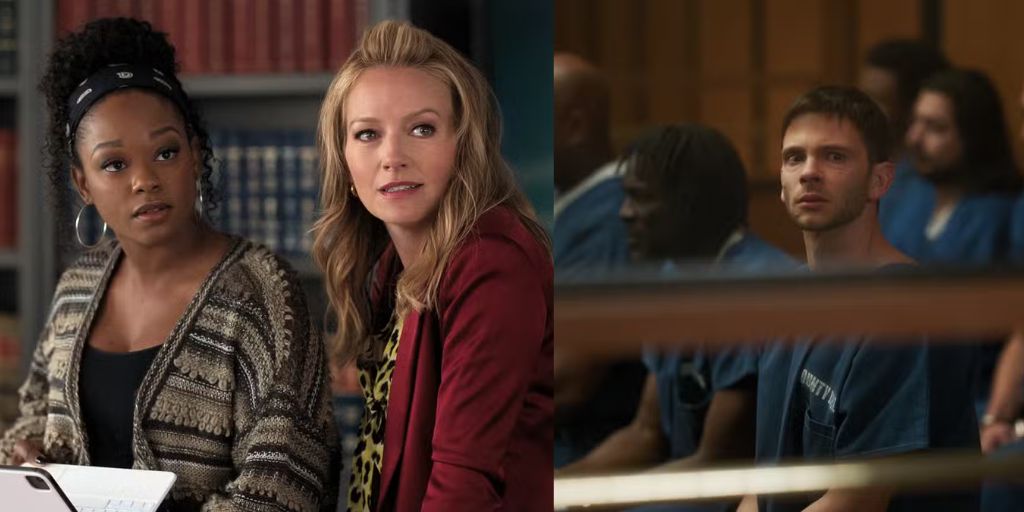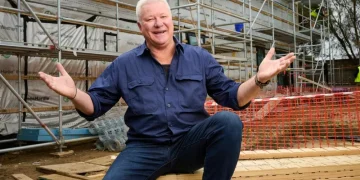In Season 3 of Netflix’s The Lincoln Lawyer, Mickey Haller, portrayed by Manuel Garcia-Rulfo, faces one of the most significant challenges of his legal career. This case is not only a test of his professional skills but also touches him on a personal level.
Mickey decides to defend Julian La Cosse, played by Devon Graye, a tech-savvy individual accused of murdering Gloria Dayton, a character who is significant in this season’s plot.
Gloria, played by Fiona Rene, was previously introduced in earlier episodes as a sex worker who went by the name of Glory Days. In the past, she had provided Mickey with vital information about a powerful cartel boss named Hector Moya, played by Arturo Del Puerto.
Julian La Cosse was deeply connected to Gloria, as he had used his technology skills to assist her in finding clients and managing appointments securely. Unfortunately, this connection may have made him a target. With the grim understanding that his relationship with Gloria could have played a part in her death, Mickey feels a strong obligation to uncover the truth about her murder.
By doing so, he hopes to clear Julian’s name and find the real killer. However, despite Mickey’s relentless efforts throughout Season 3, he finds himself entangled in a web of deceit and danger, culminating in a shocking twist that challenges everything he knows.
Mickey’s Investigation Begins
From the start of the season, it becomes clear that Mickey is not only fighting for Julian’s innocence but is also confronting his own feelings of guilt. Mickey recalls his previous interactions with Gloria, who was instrumental in helping him tackle cases involving the cartel.
Their connection runs deep, and her death weighs heavily on him. As he digs deeper into Gloria’s life, Mickey uncovers a troubling truth: Gloria did not plan to return to Hawaii, as he initially thought. Instead, she was already involved with the cartel, complicating his investigation.
Mickey’s quest for justice takes a significant turn when he learns about Gloria’s secret dealings. He discovers that Gloria was working with Drug Enforcement Administration (DEA) agent James DeMarco, played by Michael Irby, and was providing information about Hector Moya.
This shocking revelation means that Gloria’s death was not solely linked to her association with Julian but also involved higher stakes with the law enforcement agencies. This newfound information adds layers of complexity to Mickey’s task. He realizes that he must not only find Gloria’s killer but also face the murky waters of law enforcement and cartel connections.
As Mickey begins to connect the dots, he faces challenges that test his legal prowess and instincts. His investigation leads him to uncover evidence that suggests Detective Neil Bishop, played by Holt McCallany, a member of the District Attorney’s office, may have been involved in Gloria’s death.
Mickey remembers Bishop from previous encounters, particularly when he had used a legal loophole to help a criminal. This past connection makes Mickey wary as he realizes that Bishop may not be the ally he hoped for.
The Search for Evidence
The investigation intensifies when Mickey discovers security footage from the hotel where Gloria was supposed to meet a client on the day of her death. The footage reveals that Gloria was being followed by Detective Bishop. This revelation sparks suspicion in Mickey’s mind. Is Bishop simply a detective doing his job, or does he have a more significant role in the events leading to Gloria’s murder?
Mickey’s inquiry into the connection between Bishop and Agent DeMarco becomes crucial in understanding the broader implications of Gloria’s death. As he pieces together the timeline, it becomes clear that DeMarco may have played a direct role in Gloria’s demise.
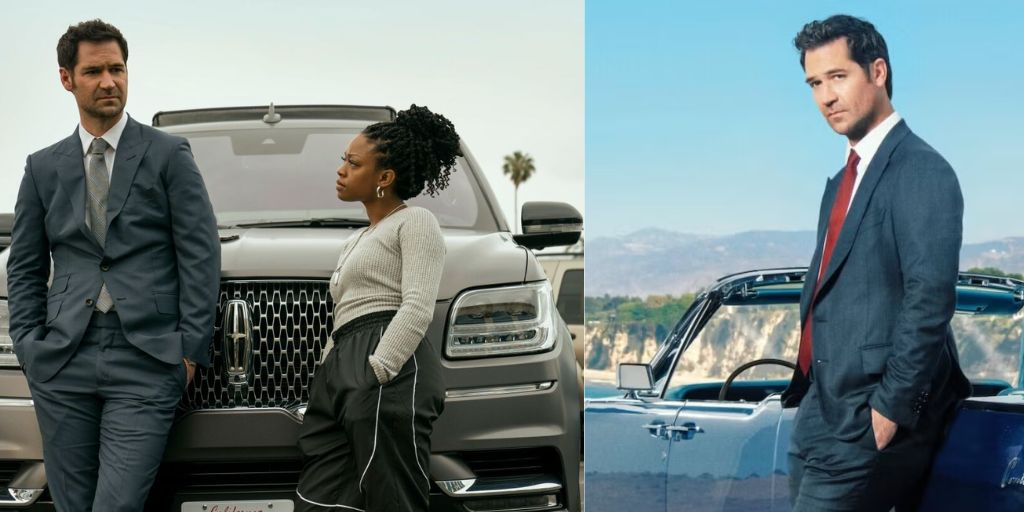
This information is critical because it shifts the blame from the cartel to law enforcement, which is a significant twist in the story. Mickey realizes that if he can prove DeMarco’s involvement, it may not only clear Julian’s name but also bring justice for Gloria.
The relationship between Bishop and DeMarco deepens the intrigue. Mickey learns that Bishop was involved in a cover-up related to cartel killings ten years ago. DeMarco had approached Bishop then, offering him money to keep quiet about a double homicide connected to cartel activity.
Bishop, facing personal struggles, accepted the bribe, leading to a precarious situation for him. Now, it seems that Bishop is caught in a cycle of blackmail, forced to do DeMarco’s bidding.
Detective Bishop’s Revelation
As Mickey’s investigation continues, the tension builds. He confronts Bishop about his involvement in Gloria’s case. Bishop, however, is defensive and evasive, raising further suspicions in Mickey’s mind. To strengthen his case against DeMarco, Mickey decides to show Bishop the video evidence he has collected. This video captures Bishop and DeMarco planting drugs at a witness’s house, exposing their illicit activities.
When confronted with this evidence, Bishop appears shocked and conflicted. He insists that he was unaware of DeMarco’s actions inside the house, but Mickey is not convinced.
This moment is pivotal as Mickey realizes that exposing DeMarco is the key to unraveling the entire conspiracy. He knows that only Bishop’s testimony can bring down DeMarco and shed light on Gloria’s tragic death.
Mickey’s demand is simple yet profound: Bishop must testify against DeMarco, or he will release the video to the public, risking Bishop’s career and reputation. This negotiation is a high-stakes game of chess, with Mickey leveraging his evidence to seek justice for Gloria. The pressure mounts as the court date approaches, and Mickey must prepare for the repercussions of exposing a powerful DEA agent.
The Courtroom Drama Unfolds
The courtroom scenes in Season 3 are intense and gripping. When Detective Bishop finally takes the stand, the tension is palpable. As he begins to recount the events surrounding Gloria’s death, the courtroom audience is attracted.
He admits that DeMarco had been blackmailing him since the bribery incident a decade earlier. This revelation shifts the narrative, as it becomes clear that DeMarco has been manipulating Bishop for years.
Bishop explains that on the day of Gloria’s death, he had been instructed by DeMarco to arrange an appointment with her under a false identity.
He describes how he tracked Gloria to her home, unaware of the deadly encounter that awaited her. Bishop’s testimony reveals the disturbing truth about how law enforcement agents can become complicit in the very crimes they are meant to investigate.
As Bishop recounts the details, he reveals that when DeMarco arrived at Gloria’s apartment, he had been instructed to leave the scene. DeMarco entered through a side entrance to avoid detection by security cameras.
This critical information paints a vivid picture of the events leading to Gloria’s death. Bishop recalls asking DeMarco about Gloria’s fate, only to be told that she was already dead by the time he arrived. DeMarco then set the place on fire, destroying any evidence that could implicate him.
The courtroom falls silent as the weight of Bishop’s confession sinks in. Prosecutor Bill Forsythe, played by John Pirruccello, and Judge Regina Turner, portrayed by Merrin Dungey, watch in shock as the truth unfolds. This testimony reveals the depth of corruption within the system, shaking the foundations of the case against Julian.
The Shocking Aftermath
Bishop’s confession is a turning point in the trial. As he spills the details about DeMarco’s involvement, it becomes evident that the real murderer is not the cartel boss, Hector Moya, but rather a law enforcement officer who abused his power. This revelation sends shockwaves through the courtroom and beyond, raising questions about accountability and justice in a flawed system.
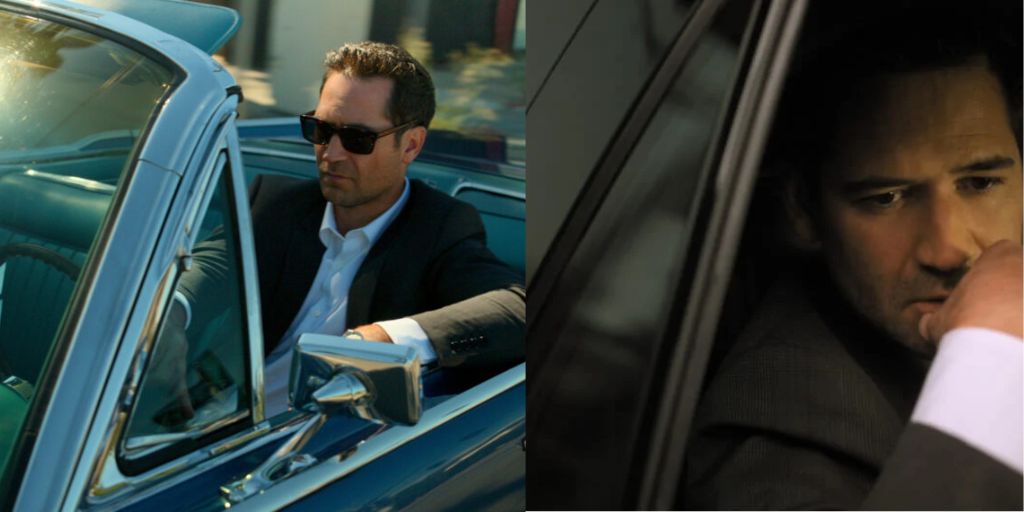
However, the drama does not end with Bishop’s testimony. In a shocking turn of events, he suddenly pulls out a hidden weapon and shoots himself in the middle of the courtroom. The audience gasps as chaos erupts, and the once-hopeful atmosphere is shattered. This act of desperation raises further questions about Bishop’s state of mind and the toll that corruption has taken on him.
Mickey is left to grapple with the implications of Bishop’s actions. After the courtroom incident, he meets with Andrea Freeman, played by Yaya DaCosta, who has been a constant source of support throughout the season. Andrea reassures Mickey that he is not to blame for Bishop’s suicide, emphasizing the deep-rooted issues within the LAPD and the DEA.
As the dust settles, Mickey breaks the news to Julian and his boyfriend David, played by Wole Parks, that the trial has been dropped. Julian is finally free, but the cost of this victory weighs heavily on Mickey. He realizes that he has faced a treacherous legal view and that the battle for justice is far from over.
A New Focus on the Future
With Julian exonerated, Mickey turns his attention to the fallout from the case. He reflects on his relationship with his daughter, Hayley, played by Krista Warner. After saving Julian, Hayley forgives Mickey for his past mistakes, which allows them to rebuild their bond. This moment of reconciliation is significant for Mickey, who has struggled with feelings of inadequacy as a father.
Mickey’s character evolves throughout Season 3. He confronts the consequences of his choices and the moral complexities of being a defense attorney.
As he faces the aftermath of the trial, he understands that his role as a lawyer carries immense responsibility. He realizes that his actions can have far-reaching implications, not just for his clients but also for the justice system as a whole.
Mickey’s Internal Struggle
Throughout Season 3, Mickey grapples with an internal emotional battle that becomes increasingly evident as the episodes unfold. He often experiences hallucinations, manifestations of his guilt and the weight of his profession.
These moments are not just artistic choices; they reflect the psychological toll that his career takes on him. The pressures of defending clients, especially those who are entangled in criminal activities, create a moral quandary that Mickey struggles to reconcile.
By the end of the season, Mickey comes to a critical realization: being a top lawyer in Los Angeles comes with a price. This acknowledgment forces him to confront his own conscience and the ethical dilemmas he faces daily.
As he faces the turbulent waters of the legal system, he learns that justice is not always black and white. The complexity of human motivations and the intricacies of the law often blur the lines, leaving Mickey to question his role in the broader narrative of justice and morality.
The Aftermath of Gloria’s Death
Mickey’s victory in court is bittersweet. While he has successfully cleared Julian’s name, the case’s dark implications linger. He understands that Gloria’s death was not an isolated incident but a part of a larger systemic failure within law enforcement.
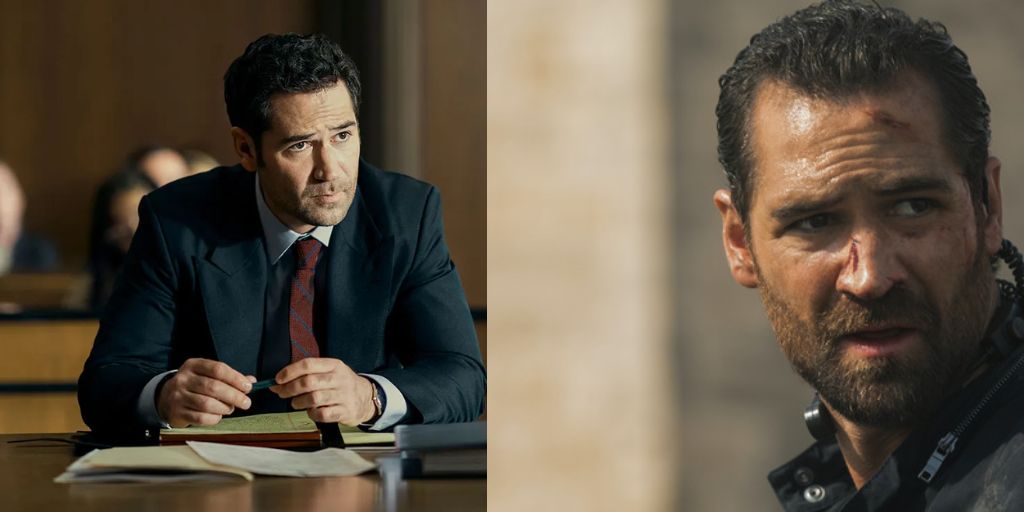
The exposure of Agent DeMarco’s corruption highlights the interconnectedness of crime and justice, raising questions about who truly holds power in the system.
As Mickey reflects on Gloria’s life and the choices she made, he gains a deeper understanding of the complexities faced by individuals in her position.
Gloria was not just a victim but a person trying to face a dangerous world. Her involvement with the cartel and law enforcement was a desperate attempt to survive. Mickey’s empathy for Gloria’s situation pushes him to consider how the legal system can better serve marginalized individuals.
This season effectively humanizes Gloria, turning her from a mere plot point into a character with depth and struggles. Mickey’s quest for justice for her is not just about exonerating Julian; it’s also about honoring Gloria’s life and recognizing her humanity. This perspective adds an emotional weight to the narrative, making the audience consider the lives behind the headlines.
Mickey’s New Case and The Rising Stakes
As Season 3 concludes, Mickey’s journey is far from over. He finds himself negotiating a significant monetary compensation deal with the District Attorney’s office, a move that underscores his commitment to his clients and his desire to hold the system accountable.
With the help of his investigator, Cisco, played by Angus Sampson, Mickey successfully uncovers the details of Agent DeMarco’s connections with the Juárez Cartel, revealing that DeMarco was secretly working for them while prosecuting cases against their rivals, the Tijuana Cartel.
This discovery paints DeMarco as not just a corrupt agent but a dangerous player in a larger game of criminal enterprise. It serves as a reminder of the lengths individuals in power will go to maintain their control. The implications of this revelation could have far-reaching effects, not only for Mickey and his clients but for the entire legal system.
Mickey’s last encounter with Hector Moya solidifies the stakes involved in his work. After Moya receives news of Agent DeMarco’s downfall, he sends Mickey a photograph of DeMarco’s lifeless body, hanging with a rattlesnake around him.
This gruesome image serves as a warning, illustrating the brutal reality of the cartel’s reach and the consequences of betrayal. It also highlights the danger that Mickey faces as he continues to uncover corruption and fight for justice.
The Tension Builds for Season 4
The final moments of Season 3 set the stage for an exciting and tension-filled Season 4. As Mickey attempts to enjoy a moment of peace after the tumultuous events, a police officer stops his car due to a missing license plate. This seemingly mundane encounter takes a dark turn when the officer discovers blood dripping from the trunk of Mickey’s vehicle.
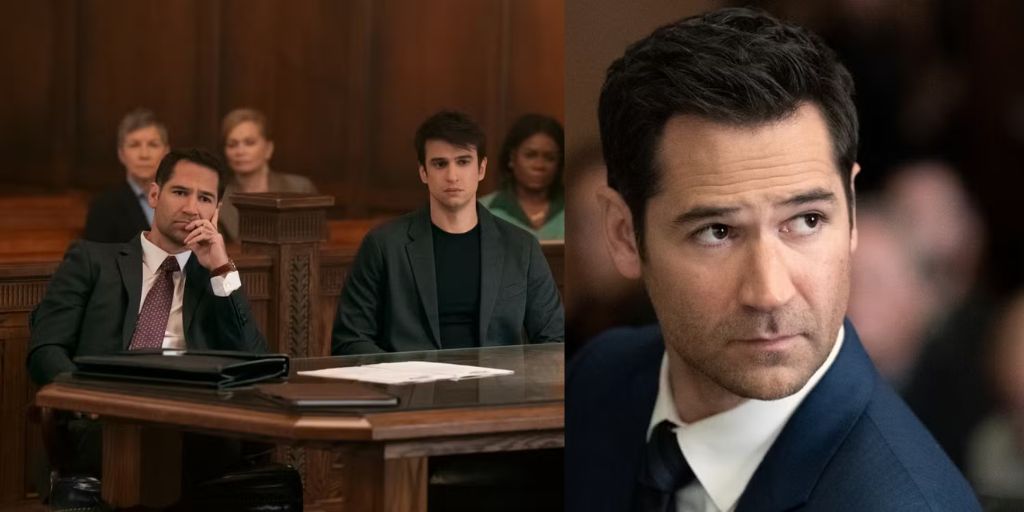
When the trunk is opened, it reveals the lifeless body of Sam Scales, a recurring character known for his dubious activities and connections to Mickey’s past. This shocking development indicates that someone is framing Mickey, an inevitable consequence of the enemies he has made through his relentless pursuit of justice. The implication that he could be implicated in a murder investigation adds a layer of suspense and urgency to the upcoming season.
This twist not only raises the stakes for Mickey but also forces him to confront the repercussions of his actions. With powerful adversaries in the cartel and corrupted law enforcement, Mickey must now defend himself while simultaneously seeking to uncover the truth behind Sam’s death. The intricate web of deceit he has uncovered throughout Season 3 will come back to haunt him in ways he never anticipated.
Mickey’s Evolution as a Character
As the series progresses, Mickey Haller undergoes significant character development. His experiences in Season 3 force him to confront his past decisions, re-evaluate his moral compass, and ultimately reshape his approach to law and justice. This transformation is not only about professional growth; it is also a deeply personal journey.
Mickey’s relationship with his daughter Hayley reflects this evolution. After their reconciliation, he becomes more determined to be a better father and role model. The lessons he learns about accountability, empathy, and the impact of his choices influence his interactions with his family and clients.
He begins to understand that being a lawyer is not merely about winning cases but also about advocating for those who cannot fight for themselves.
Thematic Elements of Season 3
Season 3 of The Lincoln Lawyer shows several critical themes that resonate with viewers. One of the most prominent themes is the scheme of power and corruption.
The series examines how individuals in positions of authority can abuse their power for personal gain, often at the expense of justice and morality. Mickey’s battle against corrupt officials highlights the importance of accountability in the legal system.
Another theme is the complexity of human relationships, particularly in the context of law and justice. The show delves into the gray areas of morality, illustrating that individuals are often shaped by their circumstances. Characters like Gloria Dayton exemplify the struggles faced by those living on the fringes of society, forcing the audience to consider the broader societal implications of their choices.
Additionally, the season underscores the importance of redemption and personal growth. Mickey’s journey reflects the idea that it is never too late to change and make amends for past mistakes. His dedication to seeking justice for his clients, including Gloria, illustrates a commitment to doing better and helping others.
Looking Ahead: Anticipating Season 4
As viewers anticipate Season 4 of The Lincoln Lawyer, the unresolved mysteries and character arcs from Season 3 leave them eager for more. Mickey’s confrontation with the law and the cartel sets up an intriguing narrative filled with suspense and moral dilemmas. The impending investigation into Sam Scales’ death promises to test Mickey’s skills as a lawyer and his resilience as a person.
Moreover, the connections between the LAPD, the DEA, and the cartel suggest a broader conspiracy that Mickey will likely have to face. The audience is left wondering how Mickey will protect himself while continuing to fight for justice in a world where the lines between right and wrong are increasingly blurred.
The upcoming season is poised to go deeper into Mickey’s psyche, showing the consequences of his choices and the impact of his profession on his personal life. As he grapples with the realities of the legal system, viewers can expect a more profound scheme of the ethical dilemmas that define Mickey Haller’s character.
Conclusion
Season 3 of The Lincoln Lawyer presents a compelling narrative filled with twists, character development, and a poignant scheme of justice and morality.

Mickey Haller’s journey through the legal system reveals the complexities of human relationships and the challenges faced by those seeking justice. With its gripping plotlines and rich character arcs, the season sets the stage for an exciting continuation of Mickey’s story in Season 4.
As Mickey faces new challenges and confronts the consequences of his actions, viewers are left with a sense of anticipation for what lies ahead. The world of The Lincoln Lawyer is filled with danger, intrigue, and the ever-present struggle for justice, making it a must-watch for fans of legal dramas.
All episodes of The Lincoln Lawyer Season 3 are currently available for streaming on Netflix, inviting both new and returning viewers to engage with Mickey Haller’s tumultuous world of law, ethics, and personal redemption.


